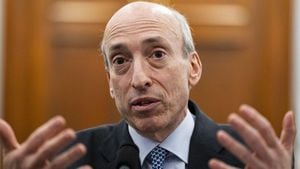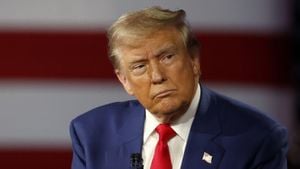Donald Trump’s anticipated return to the presidency next year could spell significant changes for TikTok, the widely popular social media app currently facing pressure from the U.S. government. The ban, which mandates TikTok’s Chinese parent company, ByteDance Ltd., to sell its U.S. operations by January 2024, poses the threat of removing one of its largest user bases, estimated at over 150 million Americans.
The legislative rock and roll began when President Joe Biden signed the new law earlier this year, citing national security concerns. Lawmakers have raised alarms about the potential for the Chinese government to access sensitive user data and exploit the platform to sway public opinion or disseminate misinformation. TikTok has consistently denied these allegations, trying to thwart the narrative by arguing against the law's constitutionality.
Now, as Trump gears up for another term, the atmosphere surrounding TikTok is shifting. He has openly opposed the TikTok legislation, claiming it contributes to unnecessary government overreach. This marks a stark pivot from Trump's initial position, where he continuously pushed for the ban during his first term, focusing on the app's supposed ties to the Chinese government.
During his campaign, Trump encouraged voters who liked TikTok to vote for him as he promised to “save” the app from restrictions. His popularity on TikTok has rapidly grown, with the former president recently surpassing 14 million followers, and insiders suggest this could influence his priorities upon returning to office. Trump's shift from adversary to defender of TikTok has left many speculating about his potential next steps.
Experts suggest several strategies Trump might employ to ease the path for TikTok. One option is for Trump to advocate for Congress to repeal the legislation manding ByteDance to divest TikTok's U.S. operations. This path, though straightforward, risks backlash from both parties, as the original law was supported by broad bipartisan votes—352-65 in the House and 79-18 in the Senate.
Should Congress remain obstinate, Trump could lean on the judiciary. TikTok has already initiated legal proceedings against the law, insisting it violates First Amendment rights. Depending on the court's response, there's potential for delaying or even nullifying the enforcement of the ban before the January deadline.
If the judicial rope doesn't hold, Trump could proceed by simply refusing to enforce the law through the Justice Department. This might involve signaling to tech giants like Apple and Google not to discontinue the app from their platforms or to allow TikTok to keep its infrastructure intact. This tactic is fraught with uncertainty since companies wary of legal liabilities stand the risk of compliance without official enforcement actions.
If all else fails, another avenue could involve facilitating the sale of TikTok to U.S. interests. Trump could leverage his business acumen to broker deals with potential American buyers, maintaining TikTok's operational status. The law offers room for extension if there’s demonstrable progress toward such negotiations.
Throughout his campaign, Trump mentioned TikTok frequently, cleverly painting his Democratic rivals as adversaries to the app and its users. He claimed, “We’re not doing anything with TikTok, but the other side is going to close it up, so if you like TikTok, go out and vote for Trump.” This rhetoric shows Trump's realization of TikTok's substantial user base and influence as part of his strategy.
While the specifics of what Trump might do remain elusive, one thing is clear: his victory adds another layer of complexity to the TikTok saga. Advocates for the app see this political shift as their chance for redemption from the looming ban. On the flip side, critics warn of the potential dangers of allowing access to foreign apps without stringent oversight.
The impending court decisions set for December 6 could momentously shape the future of TikTok. If the courts rule favorably for TikTok, they could reinforce the argument against legislative overreach, setting the stage for heated discussions about public safety, privacy, and freedom of speech going forward.
All eyes will be on how this situation resolves, as the combination of politics and social media continues to unravel—consequences will be felt beyond the screen, impacting American digital culture and the social media market.
Meanwhile, TikTok CEO Shou Zi Chew remains silent, watching how this complex game of chess plays out before he moves forward with any plans. Some experts feel TikTok's approach remains cautious, knowing fully well the unpredictable nature of Trump’s decisions, reflecting on his past behavior as president.
Whatever happens next, the TikTok saga is far from over, and Trump’s arrival to office could very well rewrite its tale. Advocates on both sides brace themselves for what will surely be another chapter of intense public discourse on the finely woven fabric of policy, security, digital media, and American values.



